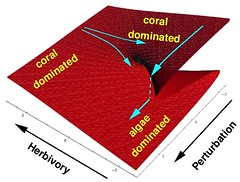Special delivery! See our visiting baby camels (Dec. 6–19) and yaks (Dec. 20–Jan. 5) this holiday. Learn more
 Ocean acidification is once again in the news, with the Monaco Declaration. There is a lot of mystery and misunderstanding surrounding this topic. Below are a few points that I sent to a group, with claims and comments such as, "This sounds very alarming, so being diligent researchers we should of course check the facts. The ocean currently has a pH of 8.1, which is alkaline not acid. In order to become acid, it would have to drop below 7.0."
Ocean acidification is once again in the news, with the Monaco Declaration. There is a lot of mystery and misunderstanding surrounding this topic. Below are a few points that I sent to a group, with claims and comments such as, "This sounds very alarming, so being diligent researchers we should of course check the facts. The ocean currently has a pH of 8.1, which is alkaline not acid. In order to become acid, it would have to drop below 7.0."
- “Acidification” refers to the lowering of pH, not whether the liquid is an acid or alkili. Acidity refers to the concentration of hydrogen ions in the liquid, of which pH is a logarithmic measure. So a decline in pH indicates an increase in the acidic properties of the liquid, regardless of what the actual pH number is. The ocean is a tremendous buffer, and pH should generally change only on geological timescales, as indeed we know it has. The fact that we have been able to measure a decrease in modern instrumental time is very disturbing.
- The decrease is driven by the increased concentration of carbon dioxide in the atmosphere. When CO2, which is very soluble, dissolves in seawater, it undergoes a series of chemical dissociations, first to form carbonic acid, then free bicarbonate ions, and finally carbonate ions. As the ocean becomes more saturated with CO2, this equilibrium is being shifted so that solid carbonate salts become more soluble. The most common biologically produced carbonate is calcium carbonate, one form of which is used by corals for the construction of their skeletons. Therein lies the reasons to worry about the corals as atmospheric CO2 concentration rises.
- There is a lot that we don’t know about the potential impact of this issue. It will definitely be detrimental for a lot of organisms, and not only because of the attack on their skeletons, but also because the increase in CO2 in the water often causes hypercapnia; think of this as strangulation underwater.
- Some organisms might benefit, and there is some experimental evidence to support this now. However, before we celebrate this, I’ve noted that the reports of these organisms generally involve species that are currently minor ecological components. If they rise to more dominant ecological roles, we’ll see a shift in community/ecosystem compositions and functioning. Whether these changes will be bad, neutral, or beneficial to other species, as well as human economic dependencies, is a wide open question. Be concerned gentlemen.
- To the coral aquarium enthusiast who claimed that his corals have never done better since adding CO2 to his water, I’ll point out simply that he is making it easier for the corals to mineralize their carbonate skeletons. His aquarium water is definitely not at a saturation point. If he’s interested, keep ramping up the CO2 concentration, and see what happens. Science at home.